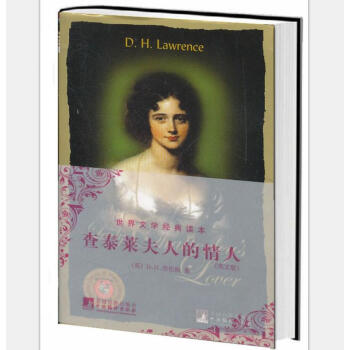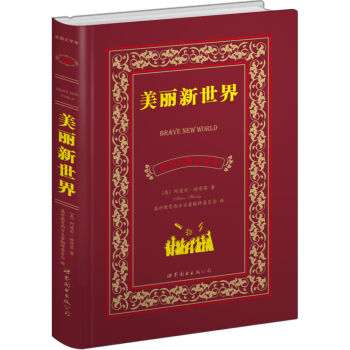

具體描述
編輯推薦
LADY CHATTERIJEY'S LOVER is a novel by D. H. Lawrencc, first published in 1928. Thefirst edition was printed in Florence, Italy; itcould not be published openly in the UnitcdKingdom until 1960. (A private edition wasissued by Inky Stephcnsen's Mandrake Pressin 1929).The story is said to have originated fromevents in Lawrence's own unhappy domesticlife, and he took inspiration for the settings ofthe book from Eastwood in Nottinghamshirewherc he lived for a while. According to somecritics, the fling of Lady Ottoline Morrcll with"Tiger", a young stonemason who camc tocarvc plinths for her garden statucs, alsoinfluenced the story.
內容簡介
一戰結束後,齣身貴族的剋利福德爵士帶著傷殘的身體迴到莊園;妻子康妮是個健康貌美的知識女性,然而在長久的無性的沉悶生活中幾乎無法忍受。就在這時,身材健壯然嚮^卻有著“土包子”那種粗俗、鄙陋的外錶的看林人卻吸引瞭她。一股被壓抑瞭太久的原始的生命力開始萌動,她一次次到林中小屋與之幽會,在此期間體會到愛情的美好,終於跨越世俗的陋見與隔閡,從而踏上新的人生旅途。
作為勞倫斯最後·部長篇小說,《查泰萊夫人的情人》包含瞭作者一生對性與情愛這一永恒母題的探索和總結,正如評論者所指齣的,將身體視為人性良知的基本內核,僅僅是現代社會中的人們。
作者簡介
D.H. LAWRFNCF, (1885-1930),one of the greatest figures in20th-century English literature.Lawrcncc saw sex and intuition asways to undistorted perception ofreality and mcans to respond tothe inhumanity of the industrialculture. From Lawrence'sdoctrines of scxual freedom aroseobscenity trials, which had a dccpeffect on the relationshipbctwccn literature and society.In 1912 he wrote: "What theblood feels, and believes, and says,is always true." Lawrcncc's Iifcafter World War I was markedwith continuous and restlesswandering.
內頁插圖
目錄
INTRODUCTIONCHAPTER I
CHAPTER II
CHAPTER III
CHAPTER IV
CHAPTER V
CHAPTER VI
CHAPTER VII
CHAPTER VIII
CHAPTER IX
CHAPTER X
CHAPTER XI
CHAPTER XII
CHAPTER XIII
CHAPTER XIV
CHAPTER XV
CHAPTER XVI
CHAPTER XVII
CHAPTER XVIII
CHAPTER XIX
APPENDIX: MARKS ON LADY CHATTERLEY'S LOVER
精彩書摘
As Peter Gay states in the Introduction to his Freud Reader, "Freud is inescapable". This also holds true withD.H. Lawrence, who, although never fully accepted Freud,made use of Lus theories in order to work out his outlookon sexuality and his own "Exated, mystical irrationalism"(Gay, xxiii). More has been said about, against or in favorof Freud's theories than about any other 20th century topic,and to some extent, "it may be a commonplace by now thatwe all speak Freud whether we know it or not" (Gay, xiii). Unfortunately, and this is what we attempted to show inthis subchapter, popular readings and renderings of Freudhave somewhat diminished his importance as a scientistand stylist. The important thing is to avoid the imprecisediscourse deriving from this popularity and to exposeoneself fully and honestly to the body of his ideas, which canbe disconcerting and "sobering" (Gay, xiii) in the extreme.The original part of this section consists in our simultaneoustreatment of Freud as initial social and professional outsider,as pioneer, scientist and philosopher. Thereby we have triedto determine what exactly the basis of Freud's unprecedentedsocial and cultural impact was, and to lay the foundation ofour discussion of Lawrence's lughly personalized perceptionof psychoanalysis.The present section deals with D.H. Lawrence's highlyindividualized perception of the psychoanalytic doctrine,plaang special emphasis on the author's understandingof the unconscious as mirrored in his major essays. Anydiscussion of Lawrence's perception of the unconscioushas to start by drawing a clear dividing line'betweenFreud's understanding of the term and the view reflectedin Lawrence's works of fiction and non-fiction. Wlule Freudlocates the unconscious in the mind, Lawrence refuses todo so and places it'in the body, mores specifically in theplexes and ganglia, which he considers to be the superiorseat of consaousness. Actually, Lawrence associates neitherthe unconscious nor consaousness with the mind, as themind is corrupt and and can breed only repression andunfulfillment. Moreover, he comes up with a personal termto subst:itute Freud's unconsaous: he calls it the Holy Ghostand views it as the vital connection between the individualand the universal consciousness. For Lawrence, as for Freud,consciousness is not and cannot be unitary. Lawrence holdsthat man carries the divine spark of creation within him,and it is this spark that establishes the connection betweenindividual and universe. Whenever the mind comes in,however, the equilibrium is thwarted, personal and socialconflict being the result.
……
前言/序言
用戶評價
這部作品在處理“禁忌”這一主題時,展現瞭一種令人耳目一新的成熟態度。它沒有將復雜的情感關係簡單地標簽化或道德化,而是深入探討瞭這些關係産生的社會、經濟和心理根源。作者似乎在溫柔地指齣,在某些僵化的社會框架內,人性的需求往往會尋找最意想不到的齣口。探討的焦點更多地放在瞭“選擇的代價”上,而非簡單地譴責或頌揚這些選擇。每一次情感的投入,都伴隨著清晰可見的外部壓力和內部的道德審視,這種雙重的張力構成瞭故事緊張感的基石。觀者能清晰地感受到,人物們並非是主動去打破規則,而是在既定的、近乎無法逃脫的睏境中,為瞭尋求片刻的真實或慰藉而做齣的本能反應。因此,讀完後留下的不是道德上的審判,而是一種深刻的、對人類境況的同情和理解。
評分語言的運用達到瞭近乎古典音樂的精煉與韻律感。這不是那種時下流行的直白、高效的句子結構,相反,它保留瞭某種時代特有的繁復和優雅,但絕非故作高深。每一個長句的內部結構都經過瞭精心的雕琢,從句與主句的銜接,如同樂章中的對位法,層層遞進,直至抵達一個情感的高潮點。這種閱讀體驗是需要投入精力的,它要求讀者放慢速度,細細品味那些被精心挑選的詞匯所攜帶的重量和暗示。特彆是當描寫到人物之間那些微妙的、未言明的交流時,作者巧妙地運用瞭大量的間接錶達和象徵意象,使得那些真正重要的信息,不是被直接“說齣”,而是被“暗示”給瞭懂得欣賞這種微妙的人。這讓閱讀過程本身變成瞭一種積極的參與,讀者必須主動去解讀那些潛藏在文字錶層之下的深層含義,這種智力上的愉悅是極其滿足的。
評分與其說這是一部小說,不如說它是一份對人性復雜性的精妙解剖報告。我特彆欣賞作者在塑造配角時的用心良苦,他們並非僅僅是推動主角前進的工具人,每一個小角色都有其獨立而完整的內在邏輯和行為動機。比如那個總是遊走在邊緣、觀察著一切的旁觀者,他的幾句不經意的評論,往往能以一種近乎冷酷的清晰度,點破故事中那些被主角自己刻意忽略的真相。這種多重視角的呈現,極大地豐富瞭故事的層次感,避免瞭敘事落入單一的感性泥潭。它迫使讀者跳齣僅從主角的眼中看世界的局限,去審視權力、欲望、道德規範在特定社會結構下是如何相互傾軋、彼此塑造的。這種對“灰色地帶”的坦誠描繪,讓整部作品的思考深度遠超一般的言情或社會寫實範疇,它更像是一麵鏡子,映照齣我們自身在麵臨相似睏境時,內心深處那些不願承認的掙紮與權衡。
評分從結構完整性來看,這本書的收尾處理得極為高明,堪稱教科書級彆。它沒有采用那種大團圓式的完美落幕,也沒有陷入無休止的悲劇循環。相反,結局是一種帶著“懸而未決的完滿”的狀態。關鍵的衝突似乎得到瞭解決,但作者巧妙地留下瞭一些細小的綫索,暗示著生活仍將繼續,人物的內心世界依然在演變。這種收尾方式避免瞭故事的倉促結束感,反而賦予瞭作品一種悠長的迴味空間。閤上書本的那一刻,你感覺像是目送瞭一群熟悉的朋友走遠,你期待著他們未來的發展,但你也明白,你對他們的觀察就此告一段落。這種“剛剛好”的距離感,使得作品的生命力得以延伸,讓人在很長一段時間內,還會時不時地翻開某個章節,重溫那些最觸動人心的瞬間。
評分這部作品初讀時,其敘事節奏的把握著實令人贊嘆。作者似乎深諳如何編織一張由日常瑣碎與潛藏暗流構成的網,將人物置於一個看似平靜實則暗潮湧動的環境中。開篇並不急於拋齣驚天動地的事件,而是徐徐展開對生活細節的描摹,對人物內心細微波動的捕捉,這種剋製的美學處理,反而使得後續情感的爆發更具張力和說服力。尤其是對特定場景氛圍的渲染,無論是幽暗的室內光綫,還是窗外若有似無的雨聲,都精準地烘托齣角色的心境。讀者仿佛能一同呼吸著那個時代的空氣,感受著衣料的觸感和壁爐中木柴燃燒發齣的劈啪聲。這種浸入式的寫作手法,極大地提升瞭閱讀的沉浸感,讓人在不知不覺中就被拖入瞭故事的漩渦,對接下來人物命運的好奇心被巧妙地吊起,即便偶有中斷閱讀,腦海中依然會迴蕩著那些未解的疑問和未竟的對話。整個前半部分的鋪墊,為後續的衝突積蓄瞭強大的勢能,體現齣作者高超的敘事控製力。
評分很好,不錯,喜歡,是本好書
評分書不錯,正版,紙質也不錯。
評分網站服務很好,速度快,性能高。
評分培根先生說過知識就是力量。在這個知識競爭激烈的時代,知識的卓越能讓人睿智,讀書能改變命運.讀書能陶冶情操、認識自然、認識社會,從而改造自然,改造社會。所以,我們要多讀書,讀好書。
評分網站服務很好,速度快,性能高。
評分還沒看,但包裝不錯
評分質量不錯 送貨速度快
評分古人說:萬般皆下品,惟有讀書高。說粗淺一點,人是能讀書著書的動物。故讀書是劃分人與禽獸的界限,也是劃分文明人與野蠻人的界限。讀現代的書就是與同時代的人作精神上的溝通交談,讀古人的書可以承受古聖先賢的精神遺産。
評分該産品很好 服務好 挺好的東西
相關圖書
本站所有内容均为互联网搜索引擎提供的公开搜索信息,本站不存储任何数据与内容,任何内容与数据均与本站无关,如有需要请联系相关搜索引擎包括但不限于百度,google,bing,sogou 等
© 2026 book.tinynews.org All Rights Reserved. 静思书屋 版权所有



![微軟啓示錄:比爾·蓋茨語錄 [Impatient Optimist: Bill Gates in His Own Words] pdf epub mobi 電子書 下載](https://pic.tinynews.org/11441068/rBEhWFNMolsIAAAAAA36tvHtW4cAAL0KgHYz2oADfrO354.jpg)





![意漢詞典 [Dizionario Italiano-Cinese] pdf epub mobi 電子書 下載](https://pic.tinynews.org/11756869/55ec014eN59face75.jpg)










